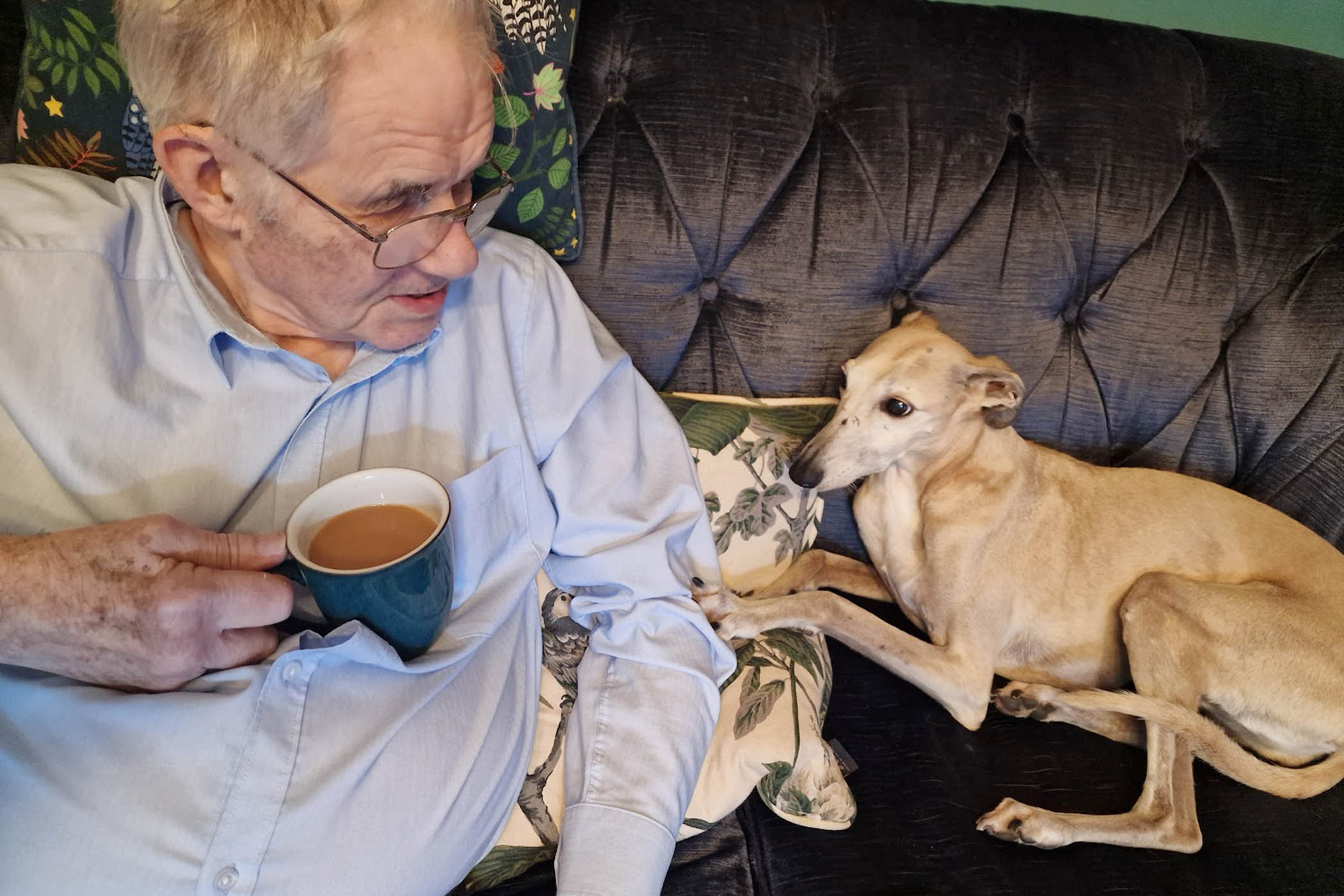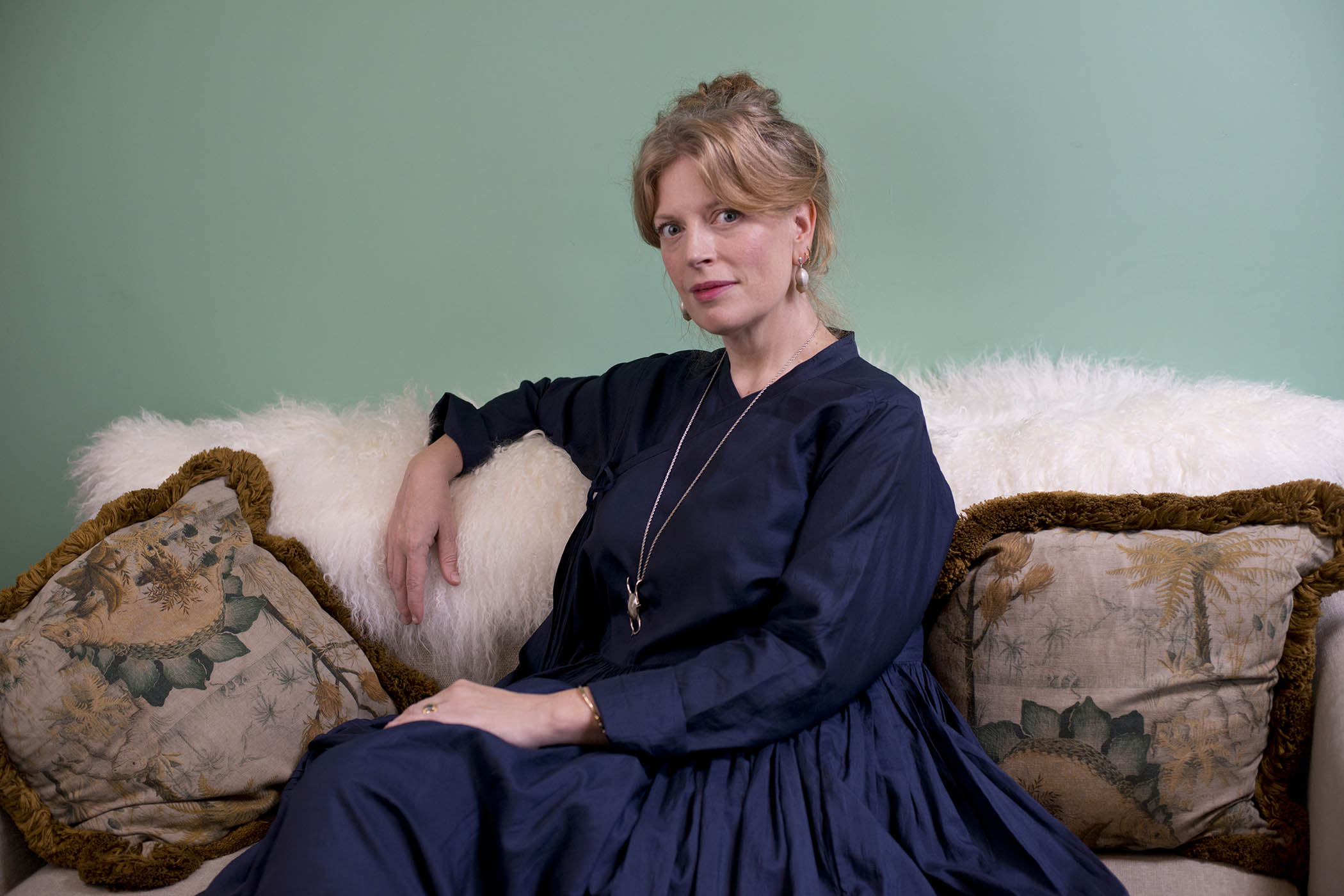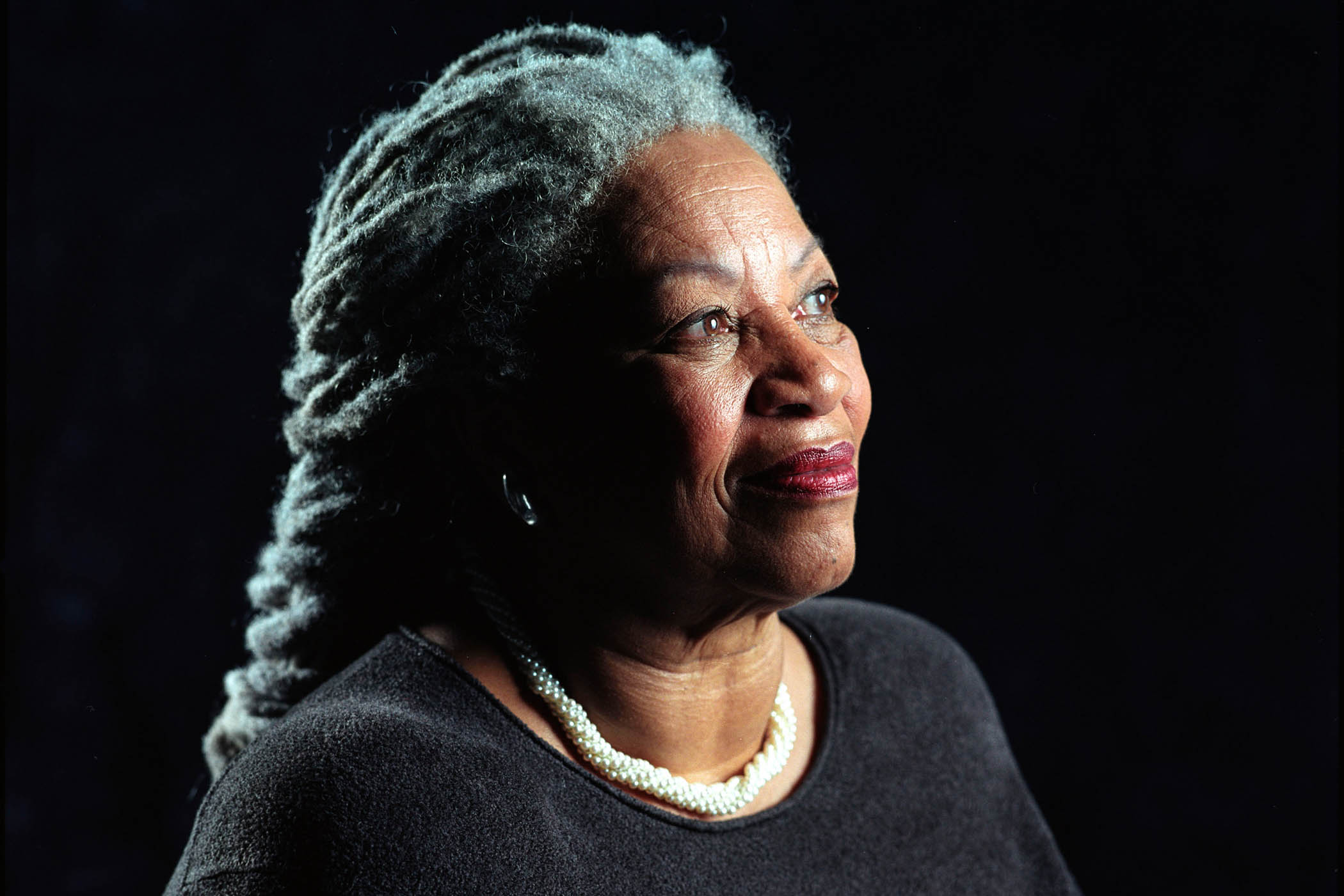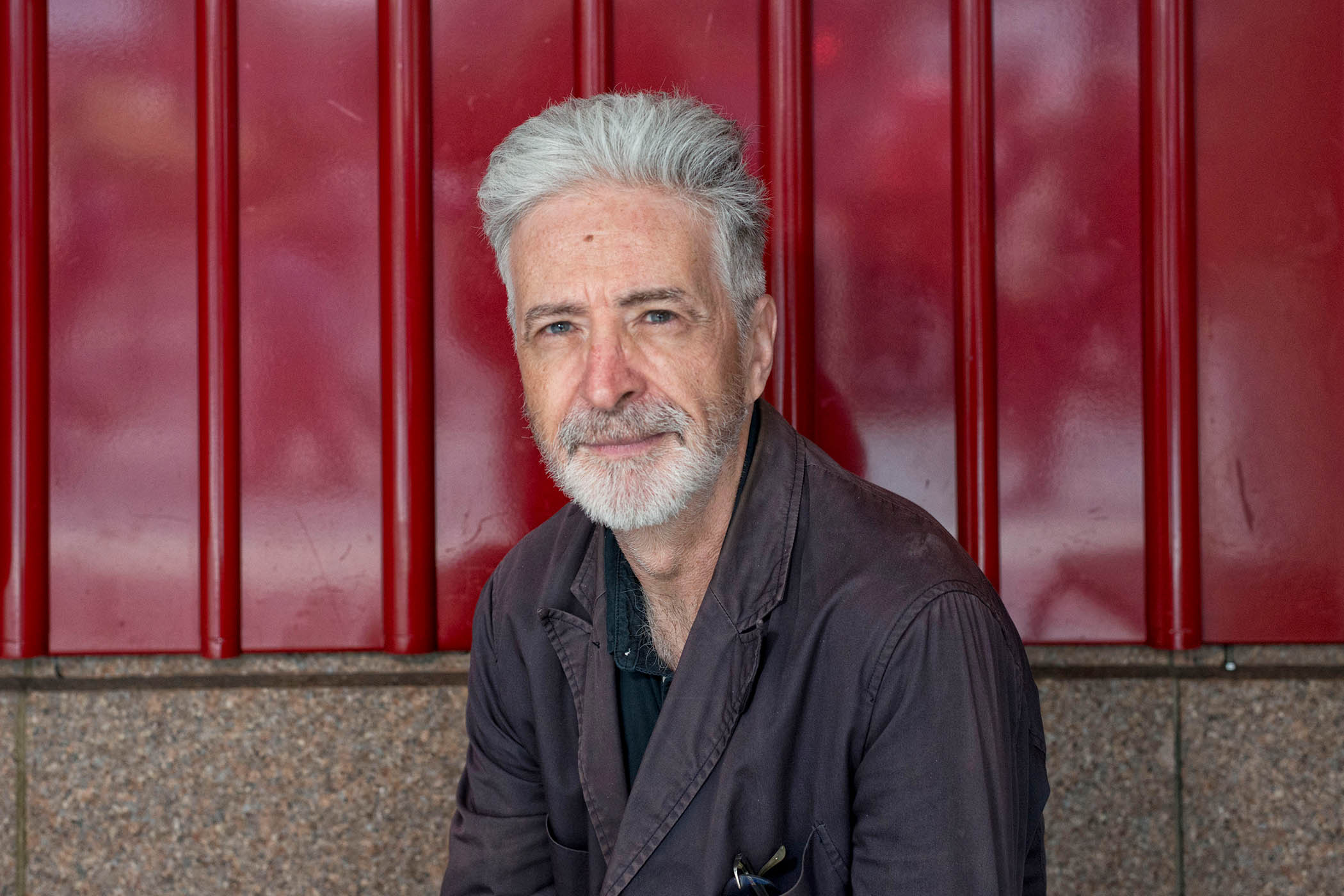From the moment Sarah Perry saw death in the face of her father-in-law David – barely a fortnight after they had eaten doughnuts at the seaside with no glimmer of the cancer that was already consuming him – she found herself inhabiting a divided self: the frightened and exhausted daughter-in-law, elbow-deep in the messy physical business of caring, and the writer, observing as if from above, knowing that when the time came she would set it all down.
“Everything that happens to me, I’m constantly transmuting it into prose, all the time,” she says, curled comfortably on a sofa in her Bloomsbury studio flat, elegant long skirt fanned around her. “It’s like there’s a parallel world – there’s reality, and then underneath it I’m turning everything into a sentence or an image. So it was inevitable in that respect that I would write about it, as a work of art, rather than therapy, because this was something extraordinary that I was seeing at close hand.”
Perry found a legion of fans in 2016 with her breakthrough second novel, The Essex Serpent, one of those rare books that earned both commercial success and literary accolades. She followed it with two novels, Melmoth and Enlightenment, and a short work of non-fiction, Essex Girls, a gleeful upending of the caricatured view of women from her home county. Though she has previously written personal essays, Death of an Ordinary Man is her first work of memoir. And while it was Perry who put the words on paper, she calls the process of writing it “a joint endeavour” with her husband Robert.

Sarah Perry’s father-in-law David on the day of his cancer diagnosis, 2022
David Perry’s unexpectedly rapid decline and death from oesophageal cancer at the age of 77, only nine days after diagnosis, left Perry and her husband unmoored, with little in the way of navigational aids (a printed NHS leaflet entitled Who to Call? becomes a constant companion, thumbed and reached for in extremis like a medieval prayer book). The lack of literary precedent for the experience into which they found themselves plummeting – the imagery of falling recurs frequently – was also a factor in her desire to write about it. “I wanted – not to sound too George Eliot and pompous – to write something that was an act of common good,” she says, with the cheerful and unself-conscious seriousness that characterises all her conversation about writing. “While it was happening, I understood that in the past a woman of my age – I was 43 at the time – would have seen death and been familiar with all the processes of it, and had rituals and companionship. But there was nothing, because death has become undomesticated and hospitalised and concealed, so I wanted to write a book that would be a friend, if you know what I mean.”
The result is a quiet masterpiece of compression that harks back to the Ars moriendi – or the “art of dying” – texts of the 15th century (just one of many learned references, which span Galileo to Lucretius, peppering a book that also deals frankly with commodes and incontinence pants). The title belies its subject, or rather, tells only half the story, because Perry takes the view that “there are no ordinary lives” and that we play out our day-to-day “against the almost incomprehensible grandeur and strangeness of the universe”.
“Death itself is the most ordinary and inevitable thing,” she explains, “and I think it should be considered more ordinary, more familiar. But it’s also the most astonishing thing I’ve ever seen, and the saddest and the most beautiful and the most terrible thing I’ve ever seen, so I’m constantly dealing with the fact that [those opposites] don’t cancel each other out, they exist together.”
This framing of individual lives in the context of infinity is common to Perry’s fiction and a worldview formed by her upbringing in a Strict Baptist congregation with clear and unshakeable doctrines about salvation and eternity. Her most recent novel, Enlightenment, was in part an examination of this background. Perry left the church in her late 20s, but David remained a believer and his final days are accompanied by a near-constant soundtrack of prayer, hymns, Bible readings and visits from the pastor. What was it like for her, I ask, watching a man approach death with the firm hope that it is not the end, when she no longer shares that faith?
“It was so interesting because it all happened so fast, I felt as if we were required to participate in what was happening to him,” she says, “and to facilitate that faith at the same time. That faith of his commanded the room, so it was entirely natural to ask the pastor to come and entirely natural that when my parents visited they would pray with him. One of the things that death requires of you is that you become very adaptable and humble, because your own faith and doubts are inconsequential against the fact that a man is dying. So, oddly, it was a time when my own slightly conflicted relationship with faith felt really easy, because that wasn’t the point. You had to subjugate yourself to what was happening.”
You become very humble. Your own faith and doubts are inconsequential against the fact a man is dying
You become very humble. Your own faith and doubts are inconsequential against the fact a man is dying
Unfolding at the same time was an ongoing challenge to the Perrys’ faith in what she calls “our British state religion”, the NHS, and the bluntness of the parallel is a source of humour in what is often a surprisingly funny book: “Make haste O Community Hub to deliver us; make haste to help us, O Hub,” she writes. But here she also allows a tightly controlled anger to cut through the measured prose – at the receptionist who books David for a blood test in three weeks’ time and doesn’t mention that there’s a walk-in clinic next door because she’d have to print off a form; at the GP who makes a reluctant house call and fails to hide her exasperation that, on account of David’s deterioration, the family haven’t yet filled in the relevant paperwork.
“I remember her getting into her car and saying, ‘I’m going on holiday tomorrow, and do you know, I haven’t even packed yet?’, and I was thinking, he’s dying, he’s dying, he’s dying. But I just said, ‘I hope you have a lovely holiday,’ and came back into the bungalow absolutely beside myself with rage. And in a very childish way, I took the DNR [Do Not Resuscitate] form that she’d told me to prop where the paramedics could see it, and I hid it.” She laughs at her own absurdity. “As if I could stop death by being cross with the GP! I thought of her as being callused,” she continues, serious again, “but then I thought, a callus forms in a place that’s been rubbed sore once too often. Doctors can’t invest all their humanity and pity in every family with a dying relative.” She pauses, then adds, with nicely judged timing: “She could possibly have invested a little more.”
Newsletters
Choose the newsletters you want to receive
View more
For information about how The Observer protects your data, read our Privacy Policy
Perry is no stranger to what Susan Sontag calls “the kingdom of the sick”; in her 30s, she was diagnosed with the autoimmune condition Graves’ disease, and has written candidly about enduring extreme pain from a ruptured disc in her spine and severe burns. But it’s one thing for a writer to use her own body as material, quite another to expose someone else to the public gaze, especially when they are no longer here to consent. Did she have qualms about compromising David’s dignity, and how did Robert feel about seeing his father portrayed in such intimate detail?
“David and Robert have both known me since I was 13,” she says, firmly, like someone who has anticipated this question and is sure of her ground. “The wonderful thing is that, when it came to Dad P, we both knew him inside out and backwards because we spent so much time together, so not only do we know what he would have said, we can literally hear the tone of voice. He’d have said, ‘Well, it doesn’t matter to me, I’m dead.’” She laughs at the image, and there is deep affection in her approximation of his voice.
“Also, he would have been quietly tickled pink, because David was effortlessly, endlessly silly and funny. I have no regrets about not having children, but it used to occur to me that no one would tell Dad P’s jokes because we had no one to pass them on to. Now I think about the fact that thousands of people will get to hear them, and chuckle, and think of our dad, and that feels like a wonderful thing to do. So, really, I never wavered. But I was grateful to know that David and Robert knew me well enough to go, ‘Well obviously, it’s what you do, isn’t it, Perry?’”
Perry wrote the book in two months – a far cry from the experience of writing Enlightenment, which took six years. Death of an Ordinary Man feels like a departure, in execution if not necessarily in style. Was it valuable creatively to do something so wholly different?
“Yes, completely – it shocked me,” she says, sitting up with the immediacy that seems to come when she talks about writing. “I don’t read my books after I’ve finished them. I have such a drive to improve, to get cleverer, more beautiful, sharper, more astute and in command of my subject and the form. So I finish a book and I can’t bear it, I have to move on to the next one.”
She breaks off and laughs. “But this one I’ve read cover to cover probably eight or nine times, and I think it’s because it marks – I don’t think ‘departure’ is the right word, because my concerns around faith, medicine, sickness, mortality, the stars, they’re all in there.” But, she says, she has approached them differently, in a compressed way. “Enlightenment was a working around and working through – myself, my history, faith, science, the novel form itself. My novels are often an attempt to synthesise these things that are hovering around me all the time, whereas Death of an Ordinary Man was like letting fly an arrow and seeing it hit the target, which is vanishingly rare as a writer.”
The universality of the subject – as Claudius tells Hamlet, everyone has to lose a father – is likely to bring it to a broad readership. Already, Perry says, she hasn’t had a response like this to a book since The Essex Serpent. But the nature of the book means that she’s made the decision not to have signing queues at book events, because readers understandably want to share their own experiences, which is too much to take on. “I just can’t carry all that sorrow,” she says.
For now, though, she says she is looking forward to “a winter of sitting at my desk with my history books”. The idea for her next novel came from a curious history of the city of Peterborough, and will be set firmly within what her husband calls the Perry Cinematic Universe. “I am bringing back Thomas Hart from Enlightenment, because I haven’t finished with him yet, and I haven’t finished with physics. But I’ve been working towards writing this book for a couple of years, and its form has changed substantially to reflect what I’ve learned from writing Death of an Ordinary Man about compression and brevity.”
It’s easy to imagine David Perry taking a quiet pride in his contribution to her evolution as, for my money, one of the most significant English writers of her generation; his characteristic “Heh, heh” echoing around the next book, and those still to come.
Death of an Ordinary Man by Sarah Perry is published by Jonathan Cape. Order a copy from observershop.co.uk
Main photograph by Sophia Evans


